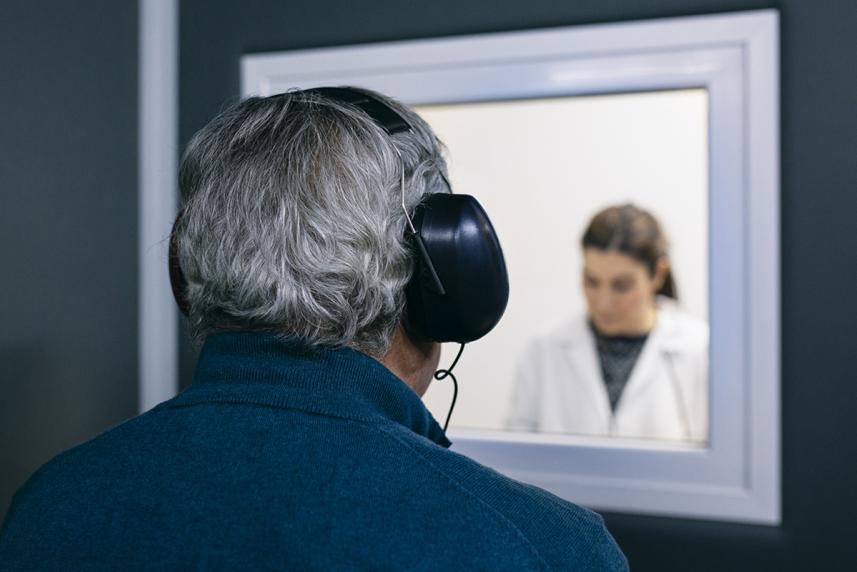
Could you be one of them?
Insurance coverage for hearing can be confusing. We explain what to look for in your plan so you know how it works.

Hearing loss can affect anyone. In fact, about 15% of Americans ages 18 and up have some trouble hearing. Hearing loss also increases with age. That’s why it’s particularly common among 60- to 69-year-olds.1
But most people don’t realize that they have hearing loss when it’s in its earliest stages. There may be subtle signs that you don’t really think about. Maybe you’ve started having to turn up the volume on your TV or phone more frequently. Or sometimes it’s hard to understand conversations in crowded areas such as a restaurant.
“Most early hearing loss problems develop slowly,” says Jeffrey S. Weingarten, M.D. He’s an otolaryngologist (ear, nose and throat specialist) in Metro Detroit, Michigan.
That’s why it may make sense to explore hearing benefits if you’re over age 60, before there’s an issue. That’s just so you’re prepared.
Insurance coverage for hearing may be confusing at first. What’s included? What happens if you need hearing aids? Are those covered too? And what about hearing exams?
Read on to find answers to your biggest questions about hearing benefits.
A good hearing plan includes an assessment by a hearing care professional.2 It’s true that your primary care provider may do a basic hearing screening at your annual checkup. But that’s not always enough to diagnose hearing loss.
A hearing assessment is more detailed. At the appointment, your hearing care professional will give you tests to determine whether:3
Then your hearing care professional can help determine what treatment options — such as hearing aids — may work best.

Could you be one of them?
If you have a hearing benefit with your health plan, it probably covers hearing aids.2 Here’s what that means:
What you’ll actually spend will depend on the type of benefit. Be sure to read the fine print. Don’t just focus on whether or not the plan covers hearing aids.
“It is also important to know how frequently the plan allows you to get a new hearing aid. Usually, it’s every 3 to 5 years,” says Dr. Weingarten.
That time frame lines up with the typical lifespan of hearing aids, he explains. Of course, hearing aid technology is always changing. You might want to upgrade more often to take advantage of new features.
When you start learning about hearing aids, you’ll find that there are a lot of choices.4 There are behind-the-ear aids that can be easier to handle and tiny in-the-ear-canal aids that are nearly invisible, says Tricia Ashby, Au.D. She’s senior director of audiology practices at the American Speech-Language-Hearing Association.
There are basic hearing aids and more advanced ones you can control with your smartphone. And, of course, you can choose from different manufacturers. The good news? At your initial hearing exam, your hearing care professional will ask questions about your lifestyle, goals and budget to help you pick a hearing aid.
You can check whether the benefit covers hearing aids through your plan documents or member website. Your hearing care professional will also be able to help you understand your specific coverage and which hearing aid type or manufacturer will be your best option.
Did you know that many hearing benefits, including a hearing exam and consultation, are covered through EPIC Hearing Healthcare? Learn more.
It’s easy to focus on coverage for hearing aids, but that may not be enough. See if your plan includes some follow-up visits. These visits could be primarily focused on making sure the hearing aids fit well and you feel comfortable operating them yourself.
Check to see how many visits are covered after you get hearing aids. EPIC covers up to three follow-ups, depending on the hearing aid.
If you have mild-to-moderate hearing loss, you may not have to see a hearing care professional or have a prescription to buy over-the-counter (OTC) hearing aids.5 Instead, you can order them directly online or buy them at a store.
These types of hearing aids are an option for people who have self-diagnosed mild to moderate hearing loss. That means you have trouble hearing conversations in a noisy place. Or you may need to turn up the TV to hear it.6
Simple models have basic features such as volume control. Some models use software and smartphone apps to test your hearing and give you more control.6
Coverage for OTC hearing aids is becoming more common, and you’ll want to check your plan benefit details to understand if you have coverage. If you do, it’s likely not all OTC hearing aids will qualify for coverage, so it’s important to do some research before purchasing OTC hearing aids.
How do you know whether to go the OTC route or get hearing coverage? Here are three potential reasons to pick a hearing benefits plan:
Top-of-the-line OTC hearing aids can cost $1,000 or more, notes Ashby. “So, at that point, then you have folks that are going, ‘Do I want to spend $1,000 and see if I can do it myself, or would I rather go see an audiologist?’”
The most important thing is to get your hearing checked and then get hearing aids if you need them. That way, you’ll be able to enjoy conversations and life again. And you may help protect your overall health too.
Sources
Information is for educational purposes only and is not a substitute for the advice of a licensed medical provider. Consult your provider prior to making changes to your lifestyle or health care routine.
EPIC benefits, features, and/or devices vary by plan/area. Limitations, exclusions and/or network restrictions may apply.